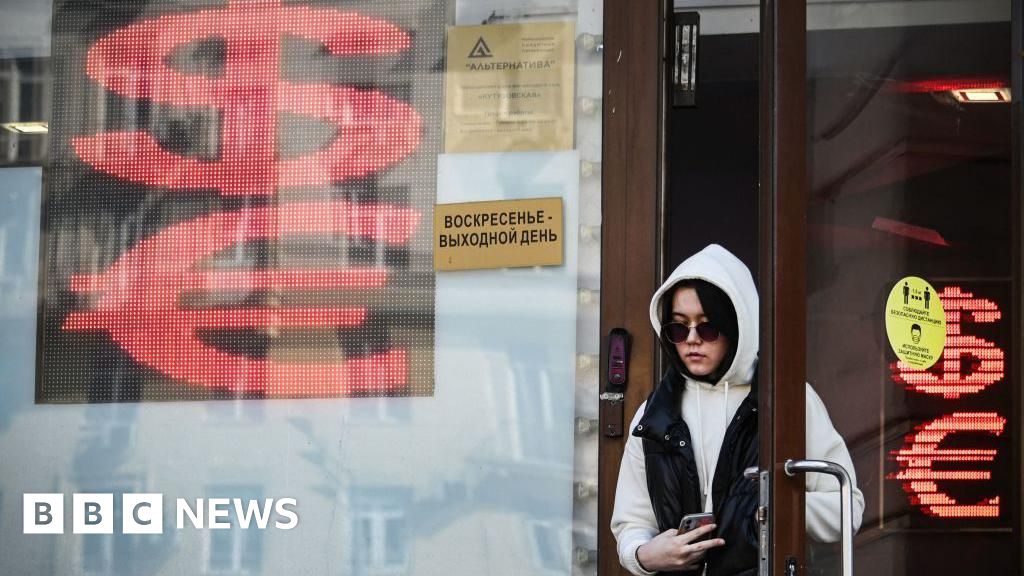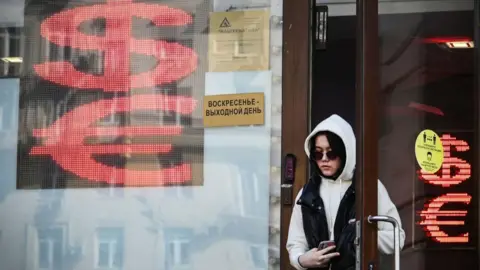US widens Russia sanctions in banking crackdown

By Tom Espiner, BBC News
 Getty Images
Getty ImagesThe US has broadened its sanctions on Russia, including a fresh crackdown on banks dealing with sanctioned entities.
It expands a December programme to target foreign banks deemed to be aiding Russia’s war effort in Ukraine.
The US also placed sanctions on the Moscow stock exchange, leading to it halting trading in dollars and euros.
It also moved to try to restrict Russia’s use of technology, including chips and software.
US President Joe Biden signed an executive order in December that imposed sanctions on banks dealing with about 1,200 individuals and companies deemed to be helping Russia’s war machine.
Those measures, which expose banks to the risk of being cut off from the US financial system, have now been expanded to about 4,500 entities.
The US will also target gold-laundering.
Peter Harrell, a former White House senior director for international economics, told the Reuters news agency that the US “is shifting towards something that begins to look like an effort to set up a global financial embargo on Russia”.
As part of this effort, the US Treasury announced that it would impose sanctions on parts of Russia’s financial system, including the Moscow Exchange, which is one of Russia’s main stock exchanges.
The stock exchange, which is Russia’s largest foreign exchange market, said the sanctions had forced it to stop trading in dollars and euros.
The US also focused on technology. Chips and other technology made in the US have been found in downed Russian equipment on Ukraine battlefields, including drones, radios, missiles and armoured vehicles.
The sanctions aim to make it more difficult for companies to supply that tech.
The US will target shell firms in Hong Kong selling chips to Russia.
In addition, software and IT services will also be restricted, although the US said its actions “are not intended to disrupt civil society and civil telecommunications”.
Despite the wave of sanctions brought against Russia since its full-scale invasion of Ukraine in February 2022, the International Monetary Fund predicts that the country will record economic growth of 3.2% this year.
But analysts said the measures will eventually make it harder for Moscow to wage its war, and over time weaken Russia’s economy.
“Russia’s war economy is deeply isolated from the international financial system, leaving the Kremlin’s military desperate for access to the outside world,” said Treasury Secretary Janet Yellen.
“Today’s actions strike at their remaining avenues for international materials and equipment, including their reliance on critical supplies from third countries,” she added.
The US announced the decision as Mr Biden prepared for a G7 summit in southern Italy with the leaders of the UK, Canada, France, Germany, Italy, and Japan.
One of the G7 leaders’ priorities is boosting support for Ukraine, which is now into its third year of resisting Russia’s invasion.
Related
Why investing in women is a vital next step for…
Get Nadine White's Race Report newsletter for a fresh perspective on the week's newsGet our free newsletter from The Independent's Race CorrespondentGet our fre
Business secretary signals major shift on electric car policy to…
In a determined effort to retain Nissan’s manufacturing presence in Britain, Business Secretary Jonathan Reynolds has vowed to implement “substantial c
Joint Statement: Business Secretary and Fujitsu Services Ltd
Business and Trade Secretary Jonathan Reynolds today (Friday 7 March) met chiefs for Fujitsu in Tokyo to begin talks over the cost of redress for victims of th
UK foreign secretary backs multilateral defence funding for Europe
UK foreign secretary David Lammy has said that a new multilateral fund will be needed to secure Europe’s defence as he confirmed that Britain is “open to”













